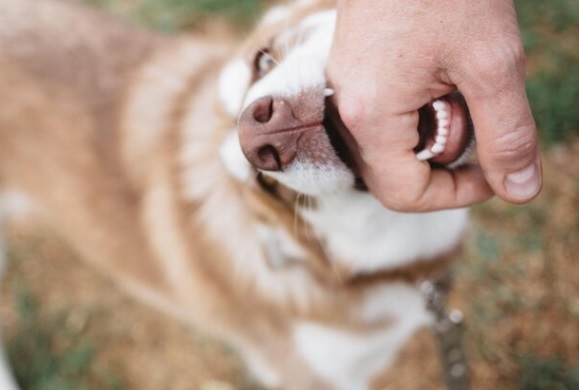
A close member of the family biting could be an unexpected, confusing, and shocking situation. Most pet owners are shocked when their dogs bite. This could be caused by fear, anxiety, or pain. This creates a paradox regarding dog bites. Most dog bites can be prevented with knowledge, understanding canine behaviour, and applying the right preventive measures.
An awareness that dog bites are an expression of some deeper issue may allow owners to become more compassionate and less critical toward their dogs. Dogs communicate through body language, and biting is a response sometimes to stress or discomfort in their own body.
In this blog, we will discuss the reasons behind dog bites, including the factors that contribute to dog biting owners, effective strategies for preventing them, and the actions to take if your dog ever bites.
Common Causes of Dog Bites
This approach is key to addressing any concerns with dog bites. Here are some common reasons why they bite:
- Fear Induced or Stress Related
Fear could be a very good reason, as dogs bite when they are afraid. Under these circumstances, the dog feels quite threatened, or it possibly feels cornered. The animal has no other means of defending itself than biting. Most dogs are not appropriately socialized or have negative experiences with humans or other animals. They go to bite as fear grips them.
- Pain or Illness
Like humans, dogs tend to show abrupt aggression when they face pain. It does not make an exception for dogs. They have enough injuries, illnesses, or discomfort that could cause biting reactions whenever touched in a sensitive place. This communication means the animal has an injury and asks for a little distance to be left untouched.
- Self-Protectiveness
They are protective creatures by nature and will bite to protect turf, food, or even their owners. There are territorial dogs that bite when a place encroachment happens or when guarding food, toys, or family members from other threats.
- Unwanted Touch or Overstimulation
Some dogs bite out of mishandling or overstimulation. This involves rough play, sudden movements, or unwanted handling as a reason for a bite. If a dog were at play and suddenly is grabbed too hard or hugged in an awkward position by its owner, it may retaliate by biting back.
Effective Ways to Prevent Dog Bites
Dogs should be appropriately trained and socialized. It is important to understand the dog’s body language and behaviour towards its surroundings to prevent dog bites among people proactively. Here are some ways you could try:
- Socialization and Training Early
When they are born, the dogs must be gently exposed to a variety of folks, animals, and environments to develop into a well-rounded pet. Socialization helps dogs gain confidence, which can lessen fearful or defensive behaviours. Basic command training like “sit,” “stay,” and “leave it” will help build clear communication between you and your dog, fostering obedience and trust.
- Positive Reinforcement Techniques
The dog owners must notice their dogs exhibiting the desired behaviour. They should reinforce this behaviour using positive strategies by giving them treats, praises, or playing with them. Reward the dog when it is engaging itself appropriately. This method builds trust and uses positive interaction reinforcement.
- Avoiding Rough Play
Small kids and other family members should learn how to handle the dogs safely. Rough play like lifting the ears or tail can create discomfort or irritation. With this kind of approach, dogs may end up feeling inclined to bite. Gentle treatment and supervised intervention would prevent harm to both humans and the dog from these effects.
- Reading and Responding to Body Language
Learning body language with your dog can prevent bites. When a dog is exhibiting signs like unease or apprehension, it is wise to give it some room. Understanding when your dog gets to that overstimulated or stressed point will help you to intervene early and redirect their focus before a nip or unwanted behavior occurs..
What to Do If Your Dog Bites?
The first thing following getting a bite from your dog will be to act quickly.
- What to do Immediately After a Bite
Make sure you are safe, and remove the dog from the situation. Check for injuries. The wound should be cleaned with soap, warm water, and pressure should be applied until bleeding ceases. Apply an antiseptic, and cover it with a clean bandage. Get medical assistance if you need it.
- Assessing the Severity of the Bite
Assess how bad the bite is. If it is deep or bleeding continues, you probably will need to see a doctor. For little, minor nips, clean and keep an eye out for infections.
- Contacting a Professional
If your dog has bitten someone, then it is time to consult with a veterinarian or dog behaviourist, or trainer. They will surely help you in sorting out the reason for aggressive characteristics of dogs and develop a correction plan for you.
Conclusion
It is very important to know what causes a dog to bite, so you have to avoid this action and create a better bond with your dog. The majority of dogs learn to nip and bite because of behaviour stemming from poor training, lack of socialization, and the owner’s not exposing the animal to mental and physical stimulations. The chances of an attack by a highly trained and well-socialized dog are rare. Such foundation training allows an owner to develop a strong and positive relationship with the dog over time. Prevention, responsibility, and knowledge of how dogs behave will help the dog biting owners reduce the incidence of dog bites. It will ensure a safer environment for you and your dog.